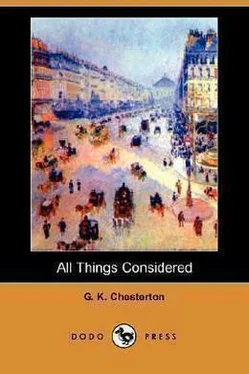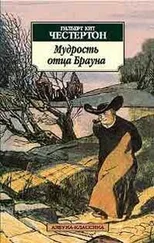First, I would make a law, if there is none such at present, by which an editor, proved to have published false news without reasonable verification, should simply go to prison. This is not a question of influences or atmospheres; the thing could be carried out as easily and as practically as the punishment of thieves and murderers. Of course there would be the usual statement that the guilt was that of a subordinate. Let the accused editor have the right of proving this if he can; if he does, let the subordinate be tried and go to prison. Two or three good rich editors and proprietors properly locked up would take the sting out of the Yellow Press better than centuries of Dr. Horton.
Second, it's impossible to pass over altogether the most unpleasant, but the most important part of this problem. I will deal with it as distantly as possible. I do not believe there is any harm whatever in reading about murders; rather, if anything, good; for the thought of death operates very powerfully with the poor in the creation of brotherhood and a sense of human dignity. I do not believe there is a pennyworth of harm in the police news, as such. Even divorce news, though contemptible enough, can really in most cases be left to the discretion of grown people; and how far children get hold of such things is a problem for the home and not for the nation. But there is a certain class of evils which a healthy man or woman can actually go through life without knowing anything about at all. These, I say, should be stamped and blackened out of every newspaper with the thickest black of the Russian censor. Such cases should either be always tried in camera or reporting them should be a punishable offence. The common weakness of Nature and the sins that flesh is heir to we can leave people to find in newspapers. Men can safely see in the papers what they have already seen in the streets. They may safely find in their journals what they have already found in themselves. But we do not want the imaginations of rational and decent people clouded with the horrors of some obscene insanity which has no more to do with human life than the man in Bedlam who thinks he is a chicken. And, if this vile matter is admitted, let it be simply with a mention of the Latin or legal name of the crime, and with no details whatever. As it is, exactly the reverse is true. Papers are permitted to terrify and darken the fancy of the young with innumerable details, but not permitted to state in clean legal language what the thing is about. They are allowed to give any fact about the thing except the fact that it is a sin.
Third, I would do my best to introduce everywhere the practice of signed articles. Those who urge the advantages of anonymity are either people who do not realise the special peril of our time or they are people who are profiting by it. It is true, but futile, for instance, to say that there is something noble in being nameless when a whole corporate body is bent on a consistent aim: as in an army or men building a cathedral. The point of modern newspapers is that there is no such corporate body and common aim; but each man can use the authority of the paper to further his own private fads and his own private finances.
ANONYMITY AND FURTHER COUNSELS
The end of the article which I write is always cut off, and, unfortunately, I belong to that lower class of animals in whom the tail is important. It is not anybody's fault but my own; it arises from the fact that I take such a long time to get to the point. Somebody, the other day, very reasonably complained of my being employed to write prefaces. He was perfectly right, for I always write a preface to the preface, and then I am stopped; also quite justifiably.
In my last article I said that I favoured three things—first, the legal punishment of deliberately false information; secondly, a distinction, in the matter of reported immorality, between those sins which any healthy man can see in himself and those which he had better not see anywhere; and thirdly, an absolute insistence in the great majority of cases upon the signing of articles. It was at this point that I was cut short, I will not say by the law of space, but rather by my own lawlessness in the matter of space. In any case, there is something more that ought to be said.
It would be an exaggeration to say that I hope some day to see an anonymous article counted as dishonourable as an anonymous letter. For some time to come, the idea of the leading article, expressing the policy of the whole paper, must necessarily remain legitimate; at any rate, we have all written such leading articles, and should never think the worse of any one for writing one. But I should certainly say that writing anonymously ought to have some definite excuse, such as that of the leading article. Writing anonymously ought to be the exception; writing a signed article ought to be the rule. And anonymity ought to be not only an exception, but an accidental exception; a man ought always to be ready to say what anonymous article he had written. The journalistic habit of counting it something sacred to keep secret the origin of an article is simply part of the conspiracy which seeks to put us who are journalists in the position of a much worse sort of Jesuits or Freemasons.
As has often been said, anonymity would be all very well if one could for a moment imagine that it was established from good motives. Suppose, for instance, that we were all quite certain that the men on the Thunderer newspaper were a band of brave young idealists who were so eager to overthrow Socialism, Municipal and National, that they did not care to which of them especially was given the glory of striking it down. Unfortunately, however, we do not believe this. What we believe, or, rather, what we know, is that the attack on Socialism in the Thunderer arises from a chaos of inconsistent and mostly evil motives, any one of which would lose simply by being named. A jerry–builder whose houses have been condemned writes anonymously and becomes the Thunderer . A Socialist who has quarrelled with the other Socialists writes anonymously, and he becomes the Thunderer . A monopolist who has lost his monopoly, and a demagogue who has lost his mob, can both write anonymously and become the same newspaper. It is quite true that there is a young and beautiful fanaticism in which men do not care to reveal their names. But there is a more elderly and a much more common excitement in which men do not dare to reveal them.
Then there is another rule for making journalism honest on which I should like to insist absolutely. I should like it to be a fixed thing that the name of the proprietor as well as the editor should be printed upon every paper. If the paper is owned by shareholders, let there be a list of shareholders. If (as is far more common in this singularly undemocratic age) it is owned by one man, let that one man's name be printed on the paper, if possible in large red letters. Then, if there are any obvious interests being served, we shall know that they are being served. My friends in Manchester are in a terrible state of excitement about the power of brewers and the dangers of admitting them to public office. But at least, if a man has controlled politics through beer, people generally know it: the subject of beer is too fascinating for any one to miss such personal peculiarities. But a man may control politics through journalism, and no ordinary English citizen know that he is controlling them at all. Again and again in the lists of Birthday Honours you and I have seen some Mr. Robinson suddenly elevated to the Peerage without any apparent reason. Even the Society papers (which we read with avidity) could tell us nothing about him except that he was a sportsman or a kind landlord, or interested in the breeding of badgers. Now I should like the name of that Mr. Robinson to be already familiar to the British public. I should like them to know already the public services for which they have to thank him. I should like them to have seen the name already on the outside of that organ of public opinion called Tootsie's Tips , or The Boy Blackmailer , or Nosey Knows , that bright little financial paper which did so much for the Empire and which so narrowly escaped a criminal prosecution. If they had seen it thus, they would estimate more truly and tenderly the full value of the statement in the Society paper that he is a true gentleman and a sound Churchman.
Читать дальше








